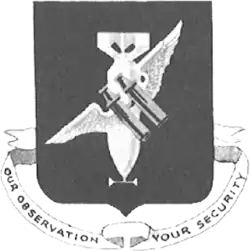76th Tactical Reconnaissance Group
The 76th Tactical Reconnaissance Group is a disbanded United States Army Air Forces organization. It was last active in 1944 as part of the Desert Training Center at Thermal Army Air Field, California.
| 76th Tactical Reconnaissance Group | |
|---|---|
 Emblem of the 76th Tactical Reconnaissance Group | |
| Active | 1942–1944 |
| Country | |
| Branch | United States Army Air Forces |
| Role | Reconnaissance |
| Part of | Third Air Force |
| Motto(s) | Our Observation, Your Security |
| Engagements | American Theater of World War II |
History
The group was constituted and activated in early 1942 at MacDill Field, Florida as the 76th Observation Group shortly after the United States entered World War II.[1] Its original squadron was the 24th Observation Squadron,[2] which was joined a few days later by the 23d Observation Squadron when the group moved to Key Field, Mississippi.[3]
The group trained in aerial reconnaissance and air support techniques until March 1943 under Third Air Force.[1] It participated in maneuvers with Second Army until September 1943 when it moved to Thermal AAF and began participating in desert training in California and Arizona.[1] In anticipation of this move, its existing squadrons were reassigned[2][4][5][6] and replaced by new units.[7][8][9] It was disbanded on 15 April 1944.[1]
Lineage
- Constituted on 5 February 1942 as the 76th Observation Group
- Activated on 27 February 1942
- Redesignated as the 76th Reconnaissance Group on 2 April 1943
- Redesignated as the 76th Tactical Reconnaissance Group on 11 August 1943
- Disbanded on 15 April 1944
Subordinate Units
|
|
Assignments
- Third Air Force, 27 February 1942
- 3d Ground Air Support Command (later III Air Support Command, III Reconnaissance Command), 27 February 1942
- Desert Training Center, ca. 20 September 1943
- III Tactical Air Division, ca. 15 December 1943 – 15 April 1944
Stations Assigned
- MacDill Field, Florida, 27 February 1942
- Key Field, Mississippi, c. 3 March 1942
- Pope Field, North Carolina, 28 March 1942[12]
- Vichy Army Air Field, Missouri, 10 December 1942[12]
- Morris Field, North Carolina, 10 May 1943[13]
- Thermal Army Air Field, California ca. 20 September 1943 – 15 April 1944
Aircraft Flown
References
Notes
- Maurer, Maurer, ed. (1983) [1961]. Air Force Combat Units of World War II (PDF) (reprint ed.). Washington, DC: Office of Air Force History. ISBN 0-912799-02-1.
- Maurer, Maurer, ed. (1982) [1969]. Combat Squadrons of the Air Force, World War II (PDF) (reprint ed.). Washington, DC: Office of Air Force History. pp. 161–162. ISBN 0-405-12194-6.
- Maurer, Combat Squadrons, p. 124
- AFHRA Factsheet, 20th Special Operations Squadron Archived 25 February 2013 at the Wayback Machine (retrieved 3 Dec 2012)
- Maurer, Combat Squadrons, pp. 330-331
- Maurer, Combat Squadrons, pp. 348-349
- AFHRA Factsheet, 91st Network Warfare Squadron Archived 20 May 2014 at the Wayback Machine (retrieved 3 Dec 2012)
- AFHRA Factsheet, 97th Intelligence Squadron Archived 13 September 2012 at the Wayback Machine (retrieved 3 Dec 2012)
- Maurer, Combat Squadrons, pp. 184-185
- Maurer, Combat Squadrons, pp. 154-155
- Maurer, Combat Squadrons, pp. 334-335
- Mueller, Robert (1989). Air Force Bases, Vol. I, Active Air Force Bases Within the United States of America on 17 September 1982 (PDF). Washington, DC: Office of Air Force History. p. 483. ISBN 0-912799-53-6.
- Abstract, History of Morris Field Nov 1940-Jul 1944 (retrieved 3 Dec 2012)
Bibliography
![]() This article incorporates public domain material from the Air Force Historical Research Agency website http://www.afhra.af.mil/.
This article incorporates public domain material from the Air Force Historical Research Agency website http://www.afhra.af.mil/.
- Maurer, Maurer, ed. (1983) [1961]. Air Force Combat Units of World War II (PDF) (reprint ed.). Washington, DC: Office of Air Force History. ISBN 0-912799-02-1.
- Maurer, Maurer, ed. (1982) [1969]. Combat Squadrons of the Air Force, World War II (PDF) (reprint ed.). Washington, DC: Office of Air Force History. ISBN 0-405-12194-6.
- Mueller, Robert (1989). Air Force Bases, Vol. I, Active Air Force Bases Within the United States of America on 17 September 1982 (PDF). Washington, DC: Office of Air Force History. ISBN 0-912799-53-6.
.svg.png.webp)